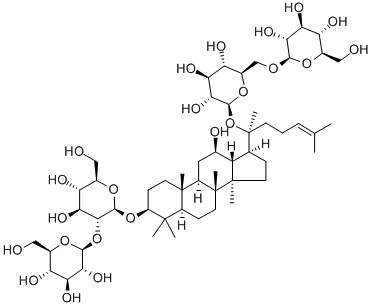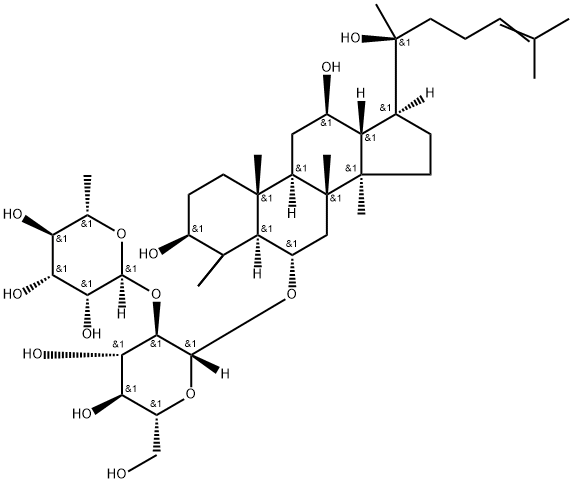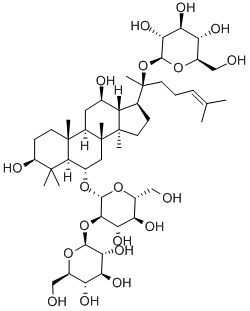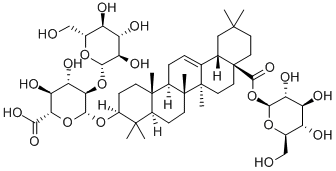Ginsenoside-Rb1 , Analysis of standards,> 98% , 41753-43-9
Synonym(s):
Arasaponin E1;Gynosaponin C;Gypenoside III;Notoginsenoside Rb1;Panaxoside Rb1
CAS NO.:41753-43-9
Empirical Formula: C54H92O23
Molecular Weight: 1109.29
MDL number: MFCD00133367
EINECS: 255-532-8
| Pack Size | Price | Stock | Quantity |
| 20MG | RMB203.20 | In Stock |
|
| others | Enquire |
PRODUCT Properties
| Melting point: | 197.5°C |
| Boiling point: | 766.35°C (rough estimate) |
| Density | 1.0971 (rough estimate) |
| refractive index | 1.6500 (estimate) |
| storage temp. | 2-8°C |
| solubility | methanol: soluble9.80 - 10.20 mg/mL, clear, colorless to faintly yellow |
| pka | 12.85±0.70(Predicted) |
| form | Solid |
| color | Off-White to Pale Beige |
| biological source | plant root (Panax ginseng) |
| Stability: | Hygroscopic |
| InChIKey | GZYPWOGIYAIIPV-VOKNSFSUNA-N |
| LogP | 2.900 (est) |
| CAS DataBase Reference | 41753-43-9(CAS DataBase Reference) |
Description and Uses
Ginsenoside Rb1, a glycosylated PPD type ginsenoside with two sugars linked to C-3 and two sugars linked to C-20, is the major active constituent of American ginseng. Studies have demonstrated the anti-aging effects of ginsenoside Rb1 at both animal and cell levels. 20-O-β-D-glucopyranosyl-20(S)-protopanaxadiol (20GPPD) is the major ingredient of ginsenoside Rb1, which has been shown to increase HAS2 expression by phosphorylating ERK and AKT signaling in human keratinocytes in a dose-dependent manner in vitro.
A major bioactive component of panax ginseng that promotes neurotransmitter release by modulating phosphorylation of synapsins through a cAMP-dependent protein kinase pathway. It has been reported to display immunostimulatory and anticancer effects.
Safety
| Symbol(GHS) |  GHS07 |
| Signal word | Warning |
| Hazard statements | H302 |
| Precautionary statements | P264-P270-P301+P312-P501 |
| Hazard Codes | Xn,Xi,T,F |
| Risk Statements | 20/21/22-39/23/24/25-23/24/25-11 |
| Safety Statements | 26-36-45-36/37-16-7 |
| WGK Germany | 3 |
| RTECS | LZ5856000 |
| HS Code | 29389090 |
| Toxicity | oms-rat-ipr 50 mg/kg CPBTAL 24,2400,76 |




